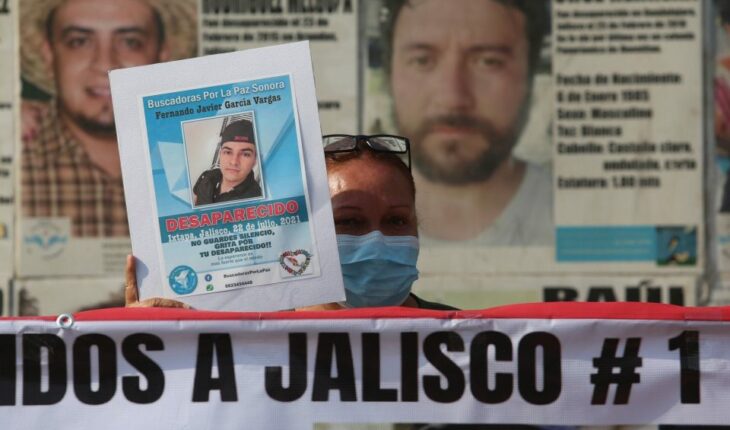Of the 12,060 files that the Special Prosecutor’s Office on Missing Persons of Jalisco (FEPD) keeps active five years after its creation, only in 246 cases has judicial intervention been achieved for the crime of disappearance, that is, 2%.
In those 246 investigations, 770 people have been identified as suspects in someone’s disappearance, but only 402 were linked to the process because the Public Ministry provided sufficient data on their probable participation in the crime, according to the report. Prosecutor’s Office adrift of the Justice Centre for Peace and Development (Cepad).
This, in a context in which Jalisco occupies the first place in the National Registry of Missing and Unlocated Persons (RNPDNO), with an official figure of 15,030 missing persons until the closing of this publication.
Among the investigations in which judicial intervention has been achieved, so far only 11 have resulted in convictions. Of these, five are for enforced disappearance — involving officials, actively or by authorization, support or acquiescence — and six for disappearance committed by private individuals.
In its analysis, Cepad warns that measuring the workload of the FEPD was a difficult task due to the opacity to report on the total universe of investigations under its charge, as well as on its assigned personnel. To this was added the difficulty in corroborating the number of locations of people who have really been the product of the work of that instance.
Despite the fact that both the regulations that regulate its function and the Approved Protocol for the Search for Missing and Unlocated Persons oblige it to generate reports on location, the agency dissociates itself arguing that it is the competence of the state search commission. Cepad also denounces that there is a constant refusal to access files, even when it is the families who request them.
The FEPD is the second instance with the largest amount of public resources of the four responsible in Jalisco for monitoring the disappearance of people, with a budget of 104 million 910 thousand 413 pesos in 2022 (11.4% more than in 2021).
According to the transversal annex of missing persons in the 2022 Expenditure Budget of the entity, almost 80% of the resources of the prosecutor’s office are destined to the “location of victims of disappearance”, while 11.7% is labeled for the systematization of context information and 8.6% for psychosocial care for victims of disappearance.
Treatment of victims
The report Prosecutor’s Office adrift It also presents the results of a survey of 72 families of disappeared persons, “which resulted in the distrust they have of the attitude of indifference of the staff who attend them.”
In this area, 44.6% of the people indicated that the staff insinuated that their missing relative may not have been the victim of a crime, in addition to the fact that in 31% of the cases they requested to wait 72 hours before being able to initiate a complaint for the disappearance. The Cepad clarifies that there is no legal basis for this bad practice, in addition to the fact that the first hours are key to locating alive.
Read: The number of disappeared grows, but not the capacity to find them: they total 100,000 amid breaches and impunity
“This has been one of the great difficulties faced by the relatives who have come to file their complaint… Particularly striking is the recurrence of this malpractice after even the state government has recalled through a press release that ‘the term of 72 hours that was applied as a recommendation before the disappearance of a person before filing a complaint is completely null and void,’ the report states.
In addition, this has not been the only reason why the opening of a file for disappearance has been denied: 8% of the people surveyed accused that staff of the prosecutor’s office denied the service for different reasons.
As part of a focus group, when asked “What is the first thing that comes to mind when you think of the prosecutor’s office for the disappeared?”, the main responses recorded by Cepad were corruption, inefficiency, revictimization and complete distrust.
Among the reasons given by some families were discriminatory attitudes to the advancement of research and the search for economic and social factors. “There is speed when they are cases of recognized people or money,” they detailed.
In addition, 52% of the people surveyed said that at some point they requested that they be carried out operational.The search for their case, but among them, in 68% of the cases the operations requested from the FEPD were not carried out or the families did not know if this had happened.
Only 32% said they were done, but of those, less than half received information about the results.
A long history of criticism and questioning
According to Cepad, the creation of the FEPD in 2017 constituted “a historical sample of the recognition of the disappearance of people in Jalisco as a generalized criminal phenomenon, also standing out for being the first institution of this nature at the national level that would attend international recommendations, would have a unit of analysis and context, and that was created with the active participation of relatives of disappeared persons. ”
PHOTO: Cuartoscuro
The unit was the result of more than 30 working meetings between relatives of disappeared persons, civil organizations and state authorities. “It was an unprecedented collaborative effort that generated expectations that this advance would bring thousands of family members closer to locating their loved ones, and accessing truth and justice,” the document states.
At that time, as of July 31, 2017 – before the National Search Commission launched the update of the statistics as they are now known – the National Registry of Data of Missing or Disappeared Persons counted 2,804 in Jalisco. Currently, there are more than 15 thousand.
However, due to the absence of public and effective indicators and evaluation mechanisms, there is no way to measure and evaluate how the problem has been addressed and whether the institution really responds to the needs of relatives of disappeared persons, as well as to what is established in local, national and international regulatory frameworks. evaluates the Cepad.
In addition, the history of the prosecution has not been exempt from questions and criticism. Since its April 2022 report, the United Nations Committee on Enforced Disappearances (CED) observed that the structure and powers of the FEPD do not correspond to the provisions of the General Law on Disappearance after its change of status to the Special Prosecutor’s Office, which has reduced its autonomy.
In addition to this, its first holder, Teresa Medina, resigned from office just two months after the creation of the prosecutor’s office in 2017. Since 2019, Blanca Jacqueline Trujillo Cuevas heads the agency; previously, the official had been mentioned in recommendation 16/2018 of the State Human Rights Commission of Jalisco, for having denied access to the investigation file to a relative of a homicide victim when he was an agent of the MP.
That same year, when there was a reclassification of the status of disappeared persons, derived from the difference that the General Law makes in the matter between disappeared persons – when the commission of a crime is presumed – and not located, Trujillo Cuevas justified that more than 5,000 cases – against one thousand 752 disappeared – were cataloged as people not located despite the fact that they had already exceeded the 72 hours that the regulations establish to consider them disappeared.
Read: Graves in every room: the search for a group of relatives of the disappeared in a Veracruz narcorrancho
During 2022, groups of relatives have demonstrated to demand his resignation, because there are no results and the attention of the staff is not adequate. In addition, in recommendation 32/2022 of the State Human Rights Commission of Jalisco, issued on July 20, which derives from 16 accumulated complaints, the FEPD is recommended that different lines of investigation be identified in the files and the degree of participation of public servants be clarified. The CEDHJ documents that there are ministerial personnel assigned from 500 to 800 investigation folders.
“Despite the fact that more than five years of work of the FEPD have passed, it has not been possible to address or eradicate the causes that have contributed to the permanence of the same deficiencies and omissions that have generated irregularities in the processes of attention and follow-up of the cases. Some of the causes have been the overload and shortage of human resources, but also insufficient training and ignorance of the corresponding regulatory frameworks,” the report describes.
This has been reflected in the lack of knowledge of the comprehensive model of attention to victims and of the processes of search and specific and differentiated investigation, in the non-application of protocols and inexperience in carrying out processes, in the lack of knowledge of technical aspects to carry out diligences or update information, as well as in negligence, Lack of ethics and insensitivity, he concludes.
With information from Siboney Flowers.
What we do at Animal Político requires professional journalists, teamwork, dialogue with readers and something very important: independence. You can help us keep going. Be part of the team.
Subscribe to Animal Político, receive benefits and support free journalism#YoSoyAnimal





